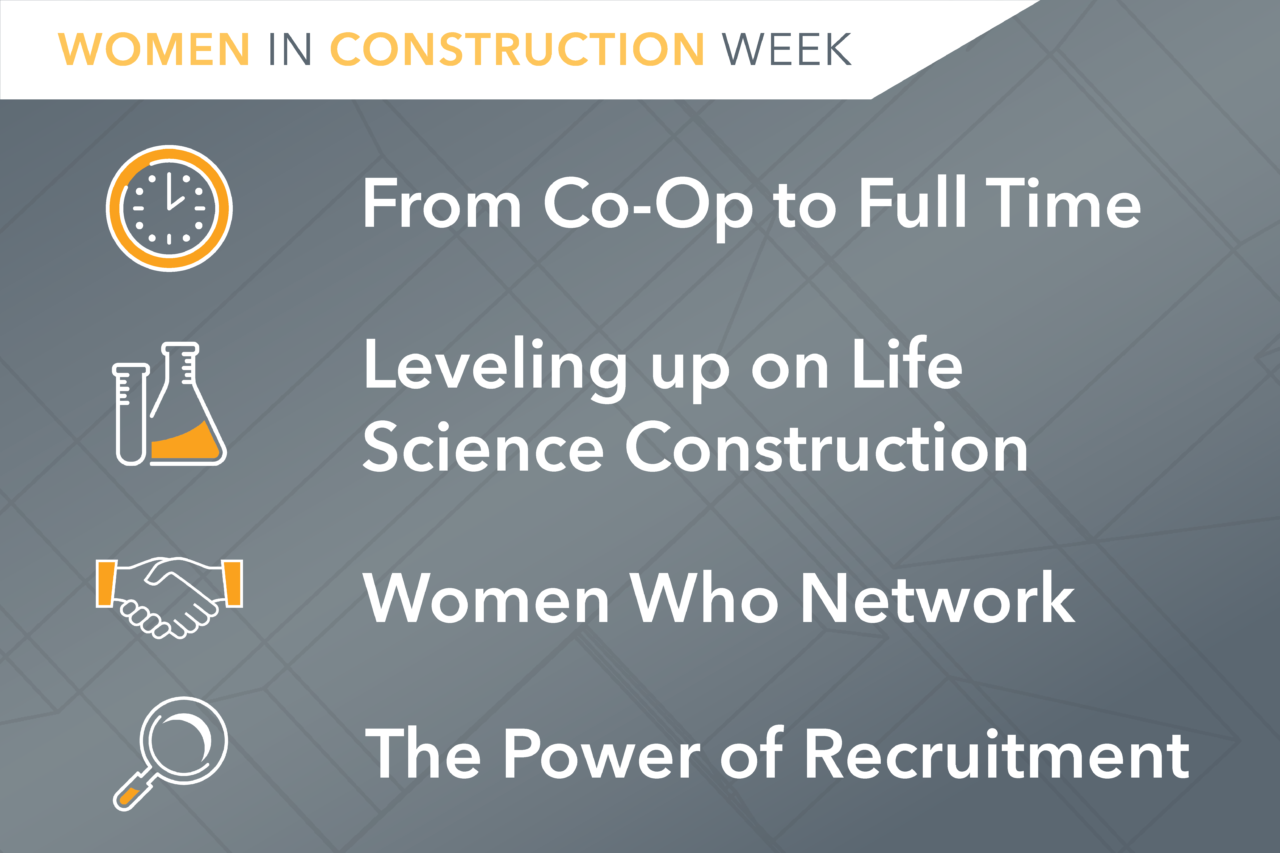
This week, Timberline is celebrating Women in Construction (WIC) Week which highlights the amazing work women are accomplishing throughout the industry. Hear from four exceptional Timberline women as they answer questions on everything from co-op experiences to life science construction, networking and more.
From Co-Op to Full Time Hire
Alex Kielty, Asst. Project Manager
 Q: What are the best and most challenging parts of your job as an Assistant Project Manager?
Q: What are the best and most challenging parts of your job as an Assistant Project Manager?
My favorite part of the job is relationship building. I like meeting and getting to know clients, architects, engineers and subcontractors on a personal level, and establishing a rapport that will last for the entire project and beyond. The most challenging part of my job is managing people – ensuring everyone is aligned with cost and schedule while making sure the project is moving forward to meet our client’s expectations.
Q: What about the Timberline co-op experience made you want to later apply for a full-time position?
The best part of my co-op was the hands-on experience I gained. I was on-site weekly, working directly with Project Executive, Mike Cashin, on the Tatte Bakery project. I was quickly brought into the fold – attending meetings, getting to know the subcontractors and learning new technologies like Procore. I felt like I actively contributed to the success of the project and was treated as a valuable part of the team.
At Timberline the people never treated me like a “student.” I felt like a true contributor, all while building a solid foundation for project management. Because of my positive experience – in the field and with the overall company culture – I saw growth potential and knew that coming back would be a great career move.
Leveling up on Life Science Construction
Jamie McDonald, Sr. Project Manager
 Q: How did you get started in life science construction and what do you like most about it?
Q: How did you get started in life science construction and what do you like most about it?
After I got my drafting degree, I started out auditing drawings for the FDA working at Pfizer. This stepping stone led to another bio/pharma job, which led to another. I enjoyed the challenge of working on life science projects – how specialized the field is with all the specifications around the equipment and standards. Understanding the business and the experience I gained on the client side has made me a better project manager. I know firsthand what our life science customers are looking for ─ their priorities and their pain points – and how to build a space that accommodates their needs and goals.
Q: Recent supply chain issues have become a major hurdle. How have you and your teams been handling the challenge?
Consistent, open and honest communication has been our biggest asset in combating supply chain issues. Our teams are always looking for constructive, creative solutions even if that means regrouping or going back to the drawing board. The lack of available materials has increased the demand for more specialized life science vendors. Our clients rely on us to provide alternative options for viable and readily available products, which has been happening more and more.
As events unfold that are outside our control, we keep our clients informed and immediately notify them of any anticipated changes or delays. We ensure everyone is in the loop – clients, vendors, the design team – and we work collaboratively together to problem solve.
Women Who Network
Kristina Esposito, Business Development Manager
 Q: You are the co-founder of a local organization. What made you want to start this women’s industry network?
Q: You are the co-founder of a local organization. What made you want to start this women’s industry network?
Early in my career, I would joke with friends and colleagues about networking events being a ‘sea of blue suits.’ We wanted to create a new space for women in the industry – an inviting environment to break into new groups, provide mentorship and talk about everything from careers to balancing marriage and kids. This concept is what PLA! (Professional Ladies Association) was formed on and still the foundation of which it operates today, ten years later. From the connections I’ve made at PLA! I have a strong network of women I trust to share ideas or get advice from both on a personal and professional level.
Q: Networking events can be overwhelming. What are some tips to those looking to sharpen their networking skills?
- Prepare – If you’re going to an event get an attendee list ahead of time to see who you are going to meet. Make sure it is the right audience and have a specific goal to achieve while you are there.
- Be ready to give your pitch – It can be harder than you think to describe what it is you or your company does. Know your “pitch” and keep it clear and concise.
- Build personal connections – Try your best to relax and be yourself. If you don’t know what to say to someone, ask questions about themselves to get a conversation going.
The Power of Recruitment
Kerri Dutra-Kelly, Director of Human Resources
 Q: As Director of Human Resources, how do you think companies in the construction industry can better attract and maintain the right talent?
Q: As Director of Human Resources, how do you think companies in the construction industry can better attract and maintain the right talent?
It all starts with engaging our current employees. At Timberline, we ensure everyone onboard understands and is aligned with our company values and mission. Our employees are our best, most important resource – once they feel connected and invested in, they can provide referrals for other candidates that are a good fit and a value add to our firm.
A positive candidate experience is also a big differentiator. We keep candidates engaged throughout the hiring process, building a connection and ensuring they have a clear understanding of the role they are applying for in addition to Timberline’s overall mission and goals.
Q: How does diversity play into recruitment, and what are some of the benefits of creating a more diverse workforce?
Bringing together people of different backgrounds and past experiences creates a wider range of perspectives when it comes to problem-solving. It shouldn’t about fulfilling a quota but encouraging a more varied and innovative talent pool. Diversity is a mindset that we embrace, as we feel it boosts creativity, innovation and ultimately, productivity.
